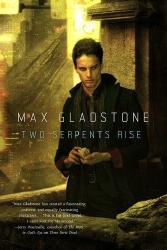
Welcome to the third and final installment of this year’s visits from the current fresh crop of Campbell Award nominees (I say “fresh” because, as noted two weeks ago, two of the five nominees were on last year’s ballots and had their most memorable meals featured here back then). Today we hear from Max Gladstone, who is a bit more traveled than most, as evidenced by the time he spent in Anhui (that’s in China) teaching English after graduating from Yale. Since then, he’s hit the fantasy circuit hard, beginning with his first novel Three Parts Dead (which was a “Massachusetts Must Read” book for 2013). The sequel, Two Serpents Rise comes out in October, and Max has at least two more books already written in this series, awaiting their turn in the publishing queue.

LMS: Welcome, Max. Regale the folks with a tale of your most memorable meal.
MG: Camping trips aren’t known for the quality of their grub. Somewhere out there, right now, a five star chef who’s hiked the Appalachian Trail with a Nalgene full of truffle oil is shouting into her monitor because I Am Wrong On The Internet, so let me specify: week-long Boy Scout camping trips aren’t known for the quality of their grub. Especially when the food in question has been dry-bagged inside a kayak for days.
When I was twelve, my scout troop set off for a week-long kayak voyage through the section of the Everglades called the Ten Thousand Islands. If you’re not familiar with Florida, the Ten Thousand Islands are not the Everglades you’re thinking of. Imagine, rather, a chain of mangroves and postage-stamp scraps of sand that occupy a 100-mile strip of warm southwest Floridian coastline. Manitees swim there, and dolphins. Sea birds fly from islet to islet. Horseshoe crabs swarm the shores, and mosquitos wait hungrily in the shade for any meat that comes to town.
We were a double-handful of kids accompanied by scoutmaster and assistant scoutmaster, going for our fifty-miler award, which you can earn in scouting if you go on a single camping trip of fifty miles or more. I was not a terribly athletic kid—I’d spent a lot of grade school reading Garfield comics and emulating the titular cat. Thanks to gentle prodding from my folks I was trying to get out, get in shape, and meet people in our new town. Scouts was part of that, and I loved it, but to say that after four days and forty-some miles of kayaking I was looking forward to a short day would be to commit the kind of understatement they send you to Rhetoric Prison for, and I don’t mean nice Rhetoric Prison.
The plan that Thursday was for a day trip: a loop tour of a few local islands from our base camp, stop for a snack about a mile away from base, then paddle home, make dinner, and enjoy the sunset in prep for a few long pulls the next couple days. The last snack stop was a welcome relief after hot sun. We ate gorp on a beach in the shadow of scrub trees. My kayakmate (all of us younger scouts were in double kayaks, so that if one of us flipped we’d both flip) spent the break looking at birds; we lingered in the shade, tired, salt-crusted, browned and burned.
Then the wind kicked up.
Our scoutmaster cut the rest short—”Guys, get into the kayaks. There’s a wind warning on the radio.” We scrambled. The sky began to glower overhead. As I pushed off in my kayak, wind tossed salt spray into my eyes.
And then the pull began.
Wind rose, and blew. The tide turned against us. My kayakmate and I dug deep into the ocean, and shouted to keep our rhythm: “Left! Right!”
We did not move. Backward, if anything.
We sang kayaking songs to keep in time. We dug with our shoulders, with our backs, with arms and legs.
We moved, a little. The wind howled in our faces. The sky went gray, and while I don’t remember rain, I do remember the spray.
Every few minutes I’d look over to judge our progress against a mangrove tree; we gained inches at most. One of the older scouts, fighting alone against the wind and the changing tide, lost ground between one glance and the next; on the third, he dug deeper, and pulled ahead.
I started laughing.
That mile took us an hour and a half to cross. For the last stretch, when our base camp was close enough to that I could see our tents, I chanted “yama yama yama yama” which was something this shaman said in the Police Academy movie we’d seen what felt like a very long time ago, back in civilization.
There’s no feeling quite like the crunch of sand under your kayak when you pull into shore after that kind of stretch, especially not when you’re twelve and have never done anything remotely similar before. Victory is sweet, and sweeter still when it’s victory against yourself.
So, the best meal I’ve ever eaten. I think that night was freeze-dried fettucine alfredo, boiled with bottled water over a camp stove. It could have been anything. It tasted like ambrosia, and I don’t mean that orange, coconut, and marshmallow salad you’ll find at southern barbecues. I mean the food the gods eat. I think we bought the packs at Wal-Mart for 99 cents each. An ingredients list longer than my arm, half of it unpronounceable. But the feeling remains.
Sitting down to write this essay I hesitated, unable to pick just one best meal. There are so many: almond milk atop Wudang Mountain above a thunderstorm. Goat barbecue after a long ride in Mongolia. Niangao at the tiny Treasure House restaurant across the street from Xiuning Middle School in Anhui after climbing down Yellow Mountain. The best meals, in the end, are the ones I’ve worked for.
Which doesn’t make the working any more pleasant at the time—but heck, at least it’s some consolation.

Thanks, Max. It’s a beautiful thing to start the week with an image in my head juxtaposing Mongolian goat barbecue and Wal-Mart ambrosia.
Next Monday: Another author and another meal!
#SFWApro
Tags: Eating Authors




Fantastic storytelling, Max. The best meals–heck, the best anythings, I’d say–are those earned with toil, love, and a touch of craziness.
07.19.13 at 12:44 pm